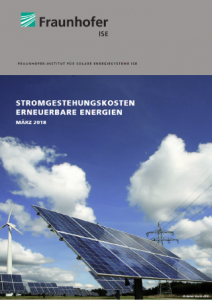Resilient Cities Congress of the Cities Network ICLEI in Bonn
The Paris Climate Agreement involves all levels of government in addressing climate change. At the local level, these are cities and municipalities. The ICLEI network of cities, which includes 22 German cities, is meeting in Bonn from 26 to 28 April for the "Resilient Cities Congress". Around 400 participants will exchange their experiences on climate protection measures and climate cooperation. The congress is an official part of the Talanoa Dialogue. Talanoa is a Fijian principle of decision-making and refers to an open dialogue that involves all stakeholders.
BMU State Secretary Jochen Flasbarth: "Cities and regions have a key role in climate protection. Worldwide, 1,500 cities are linked in the ICLEI network. In Bonn, city representatives from all over the world discuss what can be done for climate protection at the municipal level and how climate change can be countered. Ideally, the climate activities of all levels of government are coordinated. The Talanoa Dialogue is one way to organise this. It is also an opportunity to bring together voices from different actors around the world - including the visions and commitments of cities and regions - to sustain the positive momentum of Paris and stimulate the improvement of Nationally Determined Contributions (NDCs) by 2020."
Two examples of a German ICLEI member and an Asian city network illustrate climate protection efforts at the municipal level. Münster is one of the 22 German cities that is a member of the ICLEI network. The city relies on cooperation for climate protection. The local "Alliance for Climate Protection" aims to bring together relevant actors to jointly develop concrete local climate protection projects. At the same time, the actors involved in the alliance commit to reducing their greenhouse gas emissions. In doing so, they contribute to the implementation of the ambitious climate goals of the city of Münster. By 2050, greenhouse gas emissions are to be reduced by 95% and final energy consumption by 50% compared to 1990. 21% CO2 reduction could already be achieved by 2015. The "100% Climate Protection Master Plan" translates the vision of the city of Münster into a concrete strategy until 2050. The Master Plan and the Alliance are funded within the framework of the National Climate Protection Initiative (NKI) of the Federal Ministry for the Environment.
www.stadt-muenster.de/umwelt/klimaschutzkonzept-2020.html
The project "Ambitious City Promises - Climate-friendly urban development in South-East Asian cities" is also about bundling the activities of local civil society actors in the sense of ambitious municipal commitments. The international city network ICLEI is involved in the project of the International Climate Initiative (IKI) of the German Federal Ministry for the Environment and supports the development of holistic climate strategies in Hanoi (Vietnam), Jakarta (Indonesia) and Pasig City (Philippines). An important project partner is the government of the Seoul metropolitan region (Korea), which already published an ambitious mitigation plan in 2015. The "Seoul Pledge" envisages greenhouse gas reductions of 25% by 2020 and 40% by 2030 compared to 2005 and defines concrete measures for the sectors of energy, transport, resource management, water, health, urban agriculture and urban planning.
www.international-climate-initiative.com/de/nc/details/?projectid=543&cHash=9a405fa6e545b0dbd9b433a3def344b2
Keywords:
100% EEs, Stakeholders, Bonn, Climate protection, Communities, News Blog Europe (without DE), News Blog NRW, SDG 2030, Environmental policy


